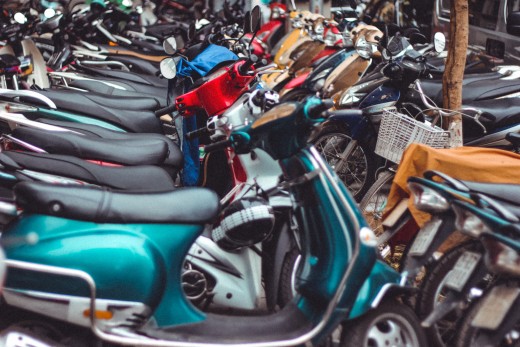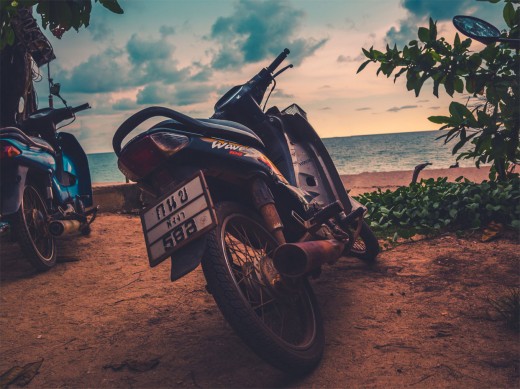- HubPages»
- Travel and Places»
- Visiting Asia»
- Southeastern Asia
5 Tips on Renting a Scooter in Thailand

This is a helpful guide meant to offer a few tips on renting a scooter in Thailand for individuals who’ll be visiting the country either for a vacation or moving overseas on a long-term basis, like a teach abroad.
This isn’t meant to work as an absolute, or ultimate, guide but a piece that can give insight on rental concerns some people may have or haven’t thought of. With that said, as a first timer or visiting alien into the Land of Smiles you should acquaint yourself with the road rules of the country to avoid legal problems.
The laws of the road are not concrete and you can ride a scooter without following them (there are local 12-year-olds who ride on public roads for example), but if you decide not to go the legal route be aware that you can’t claim insurance if you are injured or involved in an accident, and encounters with policemen are very dependent on where you are in Thailand. With that made clear, make your decision as to how you want to go about your situation and read on.
Tip 1. Getting around prices
The price of a scooter is largely dependent on where you are and for how long you wish to rent it. Tourist hotspots usually have the cheapest rental spots and a scooter should cost you about 300 Baht ($10) a day with a deposit of around 2,000 Baht ($65), although sometimes monetary deposits are not required. In comparison, rental stores in cities with less tourists (and more public transport) can have prices shoot up to 750 Baht ($25) a day with a deposit of 5,000 Baht ($163).
Insider Tip #1
If you're a vacationer your place of accommodation is likely to rent scooters or be affiliated with a rental store. Depending on the quality of the establishment (fancy vs economical) its rental prices may be overpriced or competitive. Use them as a reference point and try to see if there are nearby rental stores that can offer better priced options.
When it comes to the scooter itself the more CCs (cubic centimeters) the scooter’s engine has the more powerful it is and the pricier it becomes. If you’re new to scooters or short on confidence, rent a bike with 125cc or less; a 125cc bike should cost around 2,000 Baht ($65) per month with a deposit of around 5,000 Baht ($163). Unless you are a motorcycle enthusiast (or adrenaline junky) you will never need anything with more than 125cc, so don’t be afraid of getting a weaker, and more affordable model.
Insider Tip #2
Rent a scooter with a friend/colleague and split the cost. I’ve known people to have done this on a year contract and everyone was happy.
Tip 2. Rent a used model
Avoid new scooters like the plague. The natural impression when you are renting is that new means that it’ll look good, it’ll feel good, and, most importantly, it’ll run well, but the smart move is to throw this kind of thinking out of the window. Whether you’re new to riding or a season veteran the fact of the matter is that during the length of a rental you’ll likely pick up dents, knocks, and scratches because of your own mistakes or from the mistakes of others. And that’s OK, because you can’t predict or control these things.
What you can do is cover yourself to an extent by opting for a weathered rental as opposed to the flashiest, newest model. The idea here is that the older model already comes with a number of dents and scratches from the previous owners and so any scratches (accidentally or inevitably picked up) will be harder to notice, whereas on a new model these things are easy to spot, and when they do get spotted it’ll cost you a couple hundred Baht for the damages.
Yes, I understand that this may come across as a little conniving and dishonest to some, but you shouldn’t forget that these rentals are a business, and so you should operate with a mind to cover your own self-interests.
If you’re worried about the maintenance and smoothness of an older model, don’t be. Your rental provider is meant to take care of those as you come in for checkups and inform them of any problems you may be having. As long as you’re not the cause of the problem, fixing an issue is not meant to come at cost for you.

Tip 3. Don't ignore storage space
When you don’t have a car the storage that comes under your scooter makes a big difference. This difference is made all the more apparent when you have to run errands and do some shopping.
If you don’t have a passenger with you to carry extra packages you have to get creative and the space where you place your feet, the handlebars, and your limbs all become fair game, but you can minimize this hassle with a bigger storage place so don’t forget to look and compare your options.
A bigger storage compartment usually means the scooter becomes chunkier, and a chunky scooter can be harder to handle due to the extra weight, but it’s a sacrifice worth making if you have the option to get a model with a good storage space.
Tip 4. Be aware of what you can and cannot do on a contract
When you make a rental, regardless of how long or short you’ll utilize the scooter, you’ll have to sign a contract. You’re borrowing someone else’s property therefore you need to be aware of what terms you’re agreeing to. Whether this means thoroughly reading through the rental contract before you sign, or familiarizing yourself with it afterwards, it only helps you to know.
A few examples of some common agreements people don’t seem to realize upon signing a contract are that you have to: honor the contract for the assigned period (returning a scooter before the contract expires means losing your deposit), pay for any damages accrued during the contract (if you write-off the property you can pay up to 4x the scooter’s actual value), and/or forfeit your deposit at the end of the contract if you lose the receipt that you got for the deposit.
Insider Tip #3
If you’re on vacation and renting chances are you’ll only rent for a few days. For rentals made outside of your accommodation they typically ask to keep your ID as a deposit instead of money, so make sure you have alternative forms of ID than just your passport (any valid ID will do).
Tip 5. Sign a short contract, not a long one
This final tip is targeted to those who will be living in Thailand for more than just a vacation. If you know you will be relocating into the Land of Smiles for a year or longer and a scooter is a definite investment then hold off on signing away your money on long-term contracts.
As soon as you arrive you already know how long you’ll be in the country so the most natural thought is to get a rental that’ll cover that time, but what doesn’t come to mind as easily is that you may want to prematurely end your rental contract.
This happens for different reasons, but the biggest reason most of the people I know ended their contracts was because they decided to buy themselves a secondhand scooter or motorcycle instead of continuing with renting. In the long run this is a more affordable option because it costs less to own a scooter than it does paying rent for the length of a year or longer, and when you’re done you can always sell off your scooter to recover some of the money spent on buying one.
Other reasons of opting for a shorter contract is because unexpected events can shorten your stay in Thailand, or perhaps you’ve made local friends and they can recommend you better rental options.
Insider Tip #4
If you’re happy with your rental situation you can always extend a short contract at no additional cost.
What is your biggest concern when it comes to renting a scooter?
This content is accurate and true to the best of the author’s knowledge and is not meant to substitute for formal and individualized advice from a qualified professional.
© 2019 Maxwell Kamlongera








